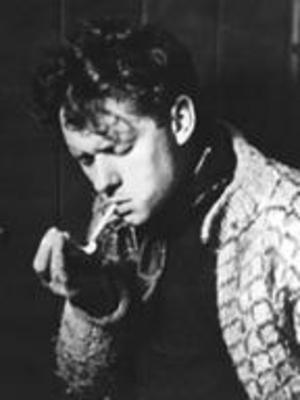La voce di un grande poeta è maledettamente emozionante.
Dylan Thomas legge la sua And death shall have no dominion, pubblicata nel 1936 in Twenty-five poems.
And death shall have no dominion, read by Dylan Thomas itself.
Dylan Thomas – And death shall have no dominion (1936)
| And death shall have no dominion. Dead men naked they shall be one With the man in the wind and the west moon; When their bones are picked clean and the clean bones gone, They shall have stars at elbow and foot; Though they go mad they shall be sane, Though they sink through the sea they shall rise again; Though lovers be lost love shall not; And death shall have no dominion.And death shall have no dominion. Under the windings of the sea They lying long shall not die windily; Twisting on racks when sinews give way, Strapped to a wheel, yet they shall not break; Faith in their hands shall snap in two, And the unicorn evils run them through; Split all ends up they shan’t crack; And death shall have no dominion. And death shall have no dominion. |
E la morte non avrà più dominio. I morti nudi saranno una cosa Con l’uomo nel vento e la luna d’occidente; Quando le loro ossa saranno spolpate e le ossa pulite scomparse, Ai gomiti e ai piedi avranno stelle; Benché impazziscano saranno sani di mente, Benché sprofondino in mare risaliranno a galla, Benché gli amanti si perdano l’amore sarà salvo; E la morte non avrà più dominio.E la morte non avrà più dominio. Sotto i meandri del mare Giacendo a lungo non moriranno nel vento; Sui cavalletti contorcendosi mentre i tendini cedono, Cinghiati ad una ruota, non si spezzeranno; Si spaccherà la fede in quelle mani E l’unicorno del peccato li passerà da parte a parte; Scheggiati da ogni lato non si schianteranno; E la morte non avrà più dominio. E la morte non avrà più dominio. |

 L’esperienza che vi propongo qui è sempre audio, ma è un po’ diversa dal solito.
L’esperienza che vi propongo qui è sempre audio, ma è un po’ diversa dal solito.